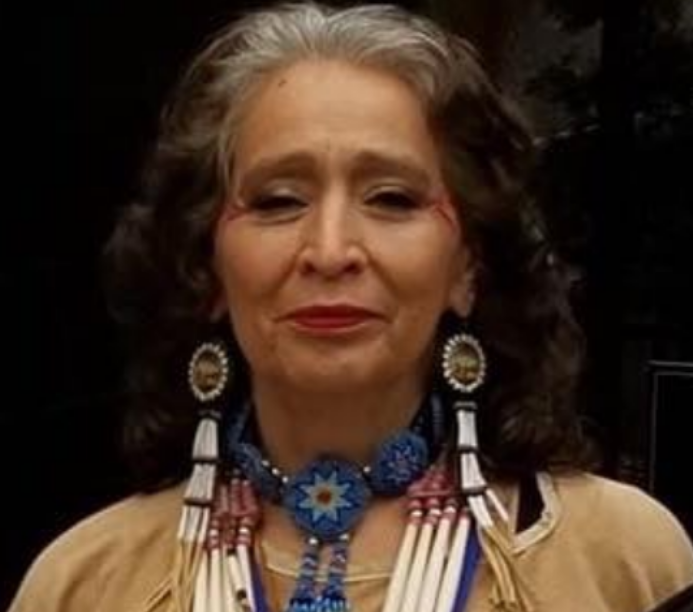
- Details
- By Darren Thompson
FT. YATES, ND—LaDonna Brave Bull Allard, one of the leaders of the Standing Rock Sioux Tribe’s fight against the Dakota Access pipeline, a Standing Rock Sioux tribal citizen and an undisputed Lakota historian, passed away on Saturday from brain cancer. She was 64.
Her family made an announcement on social media on Saturday. She had been fighting brain cancer and had undergone extensive brain surgery in Jan. 2020. Only weeks ago, she announced the cancer was in remission.
Allard was one of the leaders of the one of the largest gathering of Indigenous peoples in over a hundred years. In April 2016, she was one of the founders of the Sacred Stones Camp, which was the first resistance camp aimed at stopping the Dakota Access Pipeline in Cannonball, North Dakota on her family’s land.
Because of her leadership at Standing Rock, she quickly gained national acclaim. In the midst of the fight against the Dakota Access pipeline, she reflected on why stopping the pipeline was important to her.
"Two years ago, when Dakota Access first came, I looked at the pipeline map and knew that my entire world was in danger,” she wrote in YES! Magazine. “If we allow this pipeline, we will lose everything. We are the river, and the river is us. We have no choice but to stand up.”
After construction began near the Standing Rock Indian Reservation in August 2016, LaDonna placed an open invitation for supporters to come join the Tribe’s efforts to stop the pipeline. People throughout the world traveled to the Standing Rock Indian Reservation to support and witness construction. Many American Indian tribes and organizations, politicians, environmental groups and civil rights groups joined the effort to support the resistance at Standing Rock.
Among the allies showing their support of the Standing Rock Sioux Tribe were the Black Lives Matter movement, Indigenous leaders from the Amazon Basin of South America, Vermont Sen. Bernie Sanders, the 2016 Green Party presidential candidate Jill Stein, and thousands of other people.
“LaDonna was an extraordinary individual who showed love to everyone and her passing is a significant loss to Indian Country,” North Dakota State Representative Ruth Buffalo said to Native News Online. “Her courage was contagious and inspiring. She was very knowledgeable of the extensive history of the land and worked to preserve our history and sacred sites.”
For her efforts in leading one of the largest protests in modern history, Allard has been awarded the 2019 William Sloane Coffin Jr. Peacemaker Award, appeared on major television networks in the United States and beyond, presented at numerous summits, conferences, universities and to the United Nations on the efforts to stop the Dakota Access pipeline.
“My heart is saddened to hear of the passing of LaDonna Tamakawastewin Allard,” South Dakota state Sen. Red Dawn Foster said to Native News Online. “She inspired the world with her love for the water, the land, the people, and the love she shared with her husband Miles.”
Allard graduated away from the University of North Dakota with a degree in history. She became the Standing Rock Sioux Tribe's tourism coordinator.
She was preceded in death by her husband, Miles Allard, who passed on in Feb. 2018.
Her service has been announced next weekend in Fort Yates, North Dakota. For donations, the family is asking to send to 202 Main Street, Fort Yates, ND 58538 or PO Box 670, Fort Yates, ND 58538.
More Stories Like This
Native News Weekly (August 25, 2024): D.C. BriefsUS Presidents in Their Own Words Concerning American Indians
Native News Weekly (August 4, 2024): D.C. Briefs
Chickasaw Man Named Coach of the Year by the National Federation of State High School Associations
Native News Weekly (June 29, 2025): D.C. Briefs
Help us tell the stories that could save Native languages and food traditions
At a critical moment for Indian Country, Native News Online is embarking on our most ambitious reporting project yet: "Cultivating Culture," a three-year investigation into two forces shaping Native community survival—food sovereignty and language revitalization.
The devastating impact of COVID-19 accelerated the loss of Native elders and with them, irreplaceable cultural knowledge. Yet across tribal communities, innovative leaders are fighting back, reclaiming traditional food systems and breathing new life into Native languages. These aren't just cultural preservation efforts—they're powerful pathways to community health, healing, and resilience.
Our dedicated reporting team will spend three years documenting these stories through on-the-ground reporting in 18 tribal communities, producing over 200 in-depth stories, 18 podcast episodes, and multimedia content that amplifies Indigenous voices. We'll show policymakers, funders, and allies how cultural restoration directly impacts physical and mental wellness while celebrating successful models of sovereignty and self-determination.
This isn't corporate media parachuting into Indian Country for a quick story. This is sustained, relationship-based journalism by Native reporters who understand these communities. It's "Warrior Journalism"—fearless reporting that serves the 5.5 million readers who depend on us for news that mainstream media often ignores.
We need your help right now. While we've secured partial funding, we're still $450,000 short of our three-year budget. Our immediate goal is $25,000 this month to keep this critical work moving forward—funding reporter salaries, travel to remote communities, photography, and the deep reporting these stories deserve.
Every dollar directly supports Indigenous journalists telling Indigenous stories. Whether it's $5 or $50, your contribution ensures these vital narratives of resilience, innovation, and hope don't disappear into silence.
 The stakes couldn't be higher. Native languages are being lost at an alarming rate. Food insecurity plagues many tribal communities. But solutions are emerging, and these stories need to be told.
The stakes couldn't be higher. Native languages are being lost at an alarming rate. Food insecurity plagues many tribal communities. But solutions are emerging, and these stories need to be told.
Support independent Native journalism. Fund the stories that matter.
Levi Rickert (Potawatomi), Editor & Publisher
